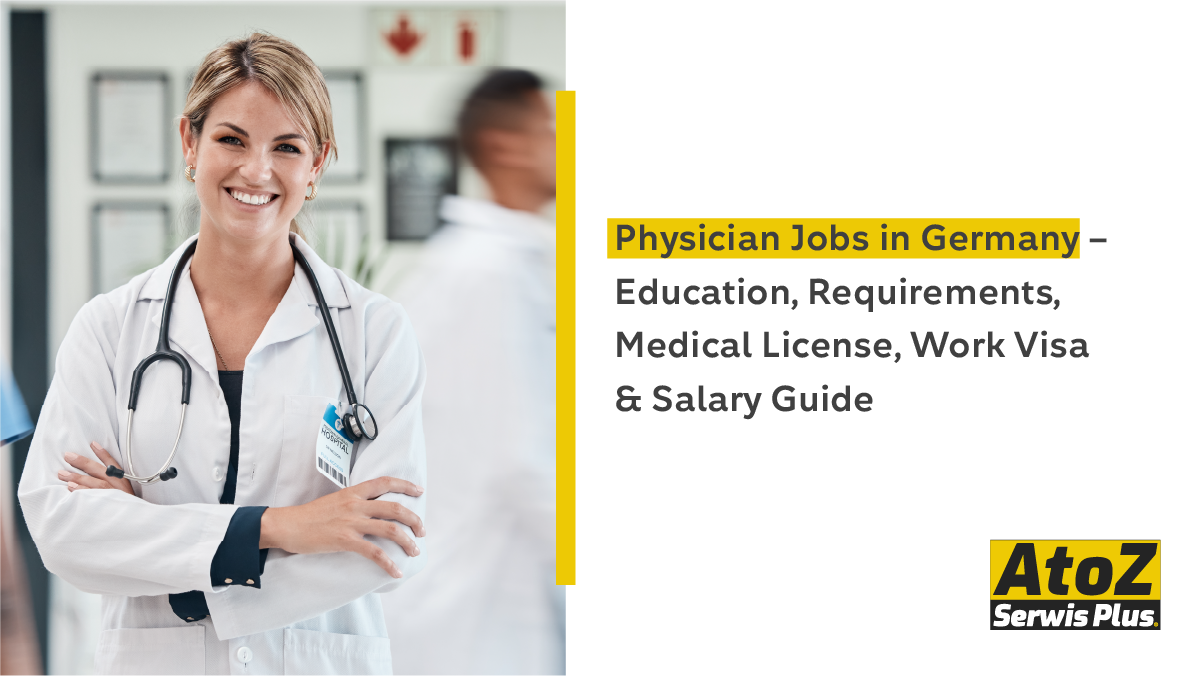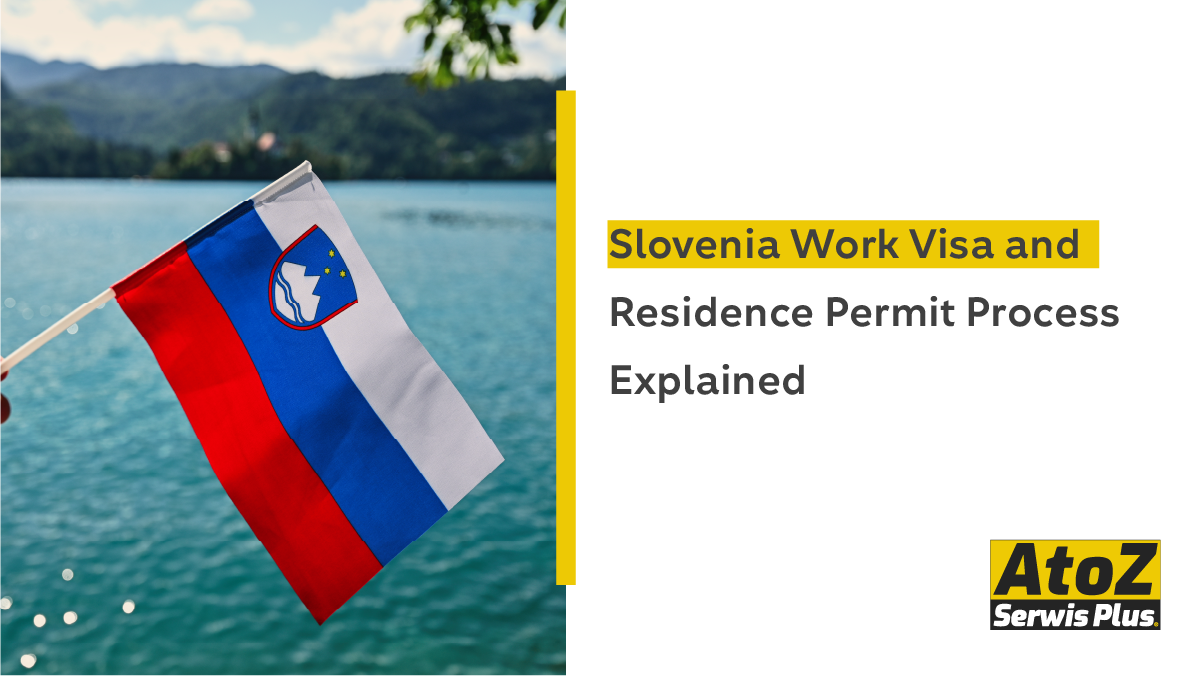

Physician Jobs in Germany - Education, Requirements, Medical License, Work Visa & Salary Guide
Germany is one of the best countries in Europe for foreign-trained doctors seeking to build a rewarding medical career. With advanced healthcare facilities, high demand for skilled professionals, competitive salaries, and a structured licensing process, the country offers countless opportunities for physicians from around the world. However, working as a doctor here requires following several essential steps — from completing the right medical degree requirements in Germany to obtaining your German medical license, applying for a German doctor work visa, and finally starting your career.
This complete guide covers everything you need to know about physician jobs in Germany — including education, language skills, medical registration, visa requirements, and salary expectations — so you can confidently plan your journey.
Step 1: Complete a medical degree
The very first requirement to work as a physician in Germany is to hold a recognised medical qualification. If you completed your medical education within the EU or EEA, your degree is usually recognised automatically. However, if you graduated outside the EU/EEA, you must go through a formal recognition process (Anerkennung) to prove that your education meets German medical standards.
During the equivalence assessment (Gleichwertigkeitsprüfung), authorities will closely examine several aspects of your education and professional background, including:
- Detailed curriculum and medical coursework
- Duration of your studies and total training hours
- Clinical rotations, internships, and hospital training experience
- Professional registration or certificate of good standing from your home country
- Any postgraduate qualifications or specialist training (if applicable)
All documents must be officially translated into German by a sworn/certified translator before submission. In most cases, authorities also require your diplomas, transcripts, internship certificates, and reference letters from previous employers or medical boards.
If the evaluation reveals significant differences between your degree and the German standard, you may be required to complete one or more of the following before being licensed:
- A knowledge test (Kenntnisprüfung) to demonstrate your medical knowledge
- A language proficiency exam in medical German (usually at B2 or C1 level)
- Additional supervised clinical training or internships in Germany
Completing this recognition process is an essential step for international medical graduates. Without it, you cannot apply for a medical license (Approbation) or work as a doctor in Germany, regardless of your experience or qualifications abroad.
Once your degree is officially recognised, you can proceed to the following stages: obtaining a medical license, applying for a physician work visa, and exploring doctor job opportunities across Germany and healthcare facilities.
Step 2: Meet the German Language Requirements
Fluent German is mandatory for all foreign doctors. You must be able to communicate clearly with patients, colleagues, and hospital staff.
- Minimum language level: B2 in general German.
- Required level for clinical practice: C1 Medizin (medical German).
- Accepted certificates: TELC B2-C1 Medizin, Goethe-Zertifikat.
Language proficiency is a key requirement for international doctors to work in Germany, and a must before applying for medical registration.
Step 3: Apply for a Medical License (Approbation)
To work as a doctor in Germany, you need the Approbation — a full and unlimited German medical license. It's issued by the state medical board (Landesprüfungsamt) and allows you to practice medicine permanently across Germany.
Required documents:
- Passport and residence permit
- Medical degree + transcripts (translated)
- Language certificates (B2 + C1 Medizin)
- Certificate of good standing
- Police clearance certificate
- Medical fitness certificate
- Curriculum vitae (CV) and motivation letter
Processing takes 3–6 months. If your degree isn't equivalent, you may be issued a temporary work permit (Berufserlaubnis) while you complete additional steps. This is a vital part of the step-by-step guide to getting a medical license in Germany.
Step 4: Secure a Job Offer from a German Employer
Before applying for a visa, you need an employment offer from a hospital, clinic, or healthcare institution. Germany has thousands of doctor vacancies each year due to its ageing population and ongoing shortage of medical professionals.
Foreign doctors can apply for positions such as:
- Resident Doctor (Assistenzarzt)
- Specialist Physician (Facharzt)
- General Practitioner
- Surgeon, Paediatrician, Cardiologist, and more
Consider applying to the best cities for doctor jobs in Germany, such as Berlin, Hamburg, Munich, Frankfurt, and Cologne, where large hospitals frequently hire foreign medical staff.
Step 5: Apply for a Work Visa
Once you have a job offer and your medical license, apply for a German doctor work visa (Type D National Visa) through your local German embassy.
Documents required:
- Valid passport
- Employment contract
- Medical license (Approbation) or temporary permit
- Language certificates
- Proof of accommodation
- Health insurance
- Police clearance certificate
Visa processing typically takes 6–12 weeks. Once approved, you can relocate and apply for a residence permit to begin your medical career in Germany.
Step 6: Relocate and Start Your Medical Career
Upon arrival, complete the following steps before you can start work:
- Register your address (Anmeldung)
- Apply for a residence permit
- Register with a health insurance provider
- Join the social security and tax system
After this, you can officially begin your physician job in Germany and start contributing to the country's system.
Step 7: Specialise and Advance Your Career
Once employed, you can pursue specialist training (Facharztausbildung) in fields such as internal medicine, surgery, radiology, cardiology, or anesthesiology.
- Duration: 5–6 years
- Conducted at accredited hospitals or clinics
- Required for higher positions and leadership roles
Completing specialisation can significantly boost your physician's career in Germany and open doors to senior-level roles such as Oberarzt (Senior Physician) or Chefarzt (Chief Physician).
Salary of Foreign Doctors in Germany
Doctor salaries in Germany are among the highest in Europe and vary depending on experience, specialisation, and employer. Below is an overview of the average salary of physicians and specialists in Germany:
|
Position |
Average Annual Salary |
|---|---|
|
Resident Doctor (Assistenzarzt) |
€55,000 – €75,000 |
|
Specialist Physician (Facharzt) |
€80,000 – €120,000 |
|
Senior Physician (Oberarzt) |
€110,000 – €150,000 |
|
Chief Physician (Chefarzt) |
€150,000 – €250,000+ |
Public hospitals offer standard salary scales, while private institutions may provide higher salaries, relocation assistance, and signing bonuses.
Final Tips for International Doctors
- Start your licensing process early — it often takes 12–18 months.
- Focus on language learning early to speed up job placement.
- Submit all documentation in certified German translations.
- Consider rural hospitals, where demand is higher and hiring is faster.
- Research the best hospitals in Germany that hire foreign doctors for faster job placement.
Our Solutions – AtoZ Serwis Plus
Connecting healthcare employers, job seekers, recruiters, and students with verified medical career opportunities across Europe and beyond.
For Healthcare Professionals – Build Your Medical Career in Europe
Are you a non-EU nurse, doctor, caregiver, or healthcare specialist looking for a stable, legal, and rewarding career in Europe? AtoZ Serwis Plus helps you take the proper steps toward employment in hospitals, clinics, care homes, and medical facilities across the EU.
Our Support Includes:
- Verified healthcare job offers from trusted European employers
- Complete assistance with work permits and visa applications
- Guidance on medical license recognition and registration
- Help with language training and professional development
- Post-arrival support for housing, local registration, and settlement
Apply Now – Healthcare Worker Registration
For Healthcare Employers – Hire Qualified Medical Professionals
Facing staffing shortages in your hospital, clinic, or care centre? AtoZ Serwis Plus connects healthcare employers with qualified, pre-screened non-EU medical professionals, ensuring full compliance with EU regulations.
What We Offer:
- Recruitment of nurses, doctors, caregivers, and healthcare technicians
- Complete work permit and visa processing support
- Full compliance checks and document verification
- Onboarding and post-arrival support to ensure smooth integration
Register Your Facility – Employer Registration
For Recruiters – Partner With AtoZ Serwis Plus
Are you an agency or recruiter placing healthcare workers abroad? Join our global partner network and offer your candidates verified healthcare jobs in Europe.
Benefits of Partnership:
- Collaboration with a trusted European recruitment company
- Access to exclusive job openings in hospitals and care facilities
- End-to-end support for visa, licensing, and work permit procedures
- Transparent agreements and long-term cooperation
Become a Partner – Healthcare Recruiter Registration
Nursing & Medical Jobs in Europe – Work Legally With AtoZ Serwis Plus
If you are a nurse, doctor, caregiver, or healthcare worker from outside the EU and dream of working in Europe, AtoZ Serwis Plus is here to guide you every step of the way. We help you navigate the entire process — from finding a verified job to obtaining your medical license, visa, and residence permit.
Our End-to-End Support Covers:
- Access to verified healthcare job offers
- Assistance with license recognition and conversion
- Guidance on language requirements and certification
- Visa and work permit support from start to finish
- Post-arrival help with accommodation and settlement
Apply Now – Start Your Healthcare Career in Europe With AtoZ Serwis Plus
Conclusion
Germany offers excellent opportunities for foreign doctors seeking a stable, respected, and high-paying career. The process involves obtaining a recognised medical degree, meeting language requirements, applying for a German medical license, securing a job, and completing the doctor visa process for Germany. With proper planning and preparation, you can successfully navigate the system and enjoy a fulfilling medical career in one of Europe's advanced healthcare systems.
















